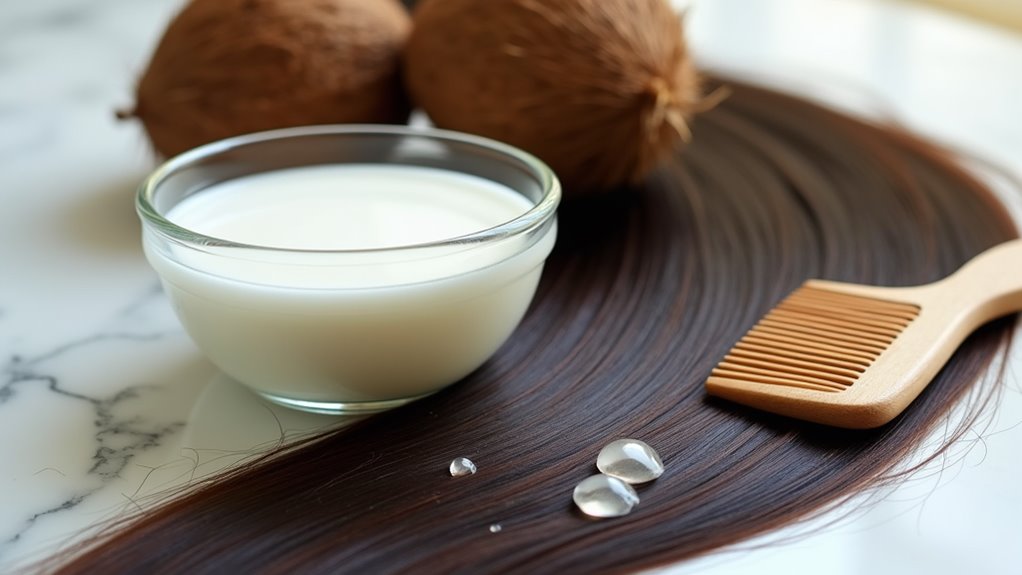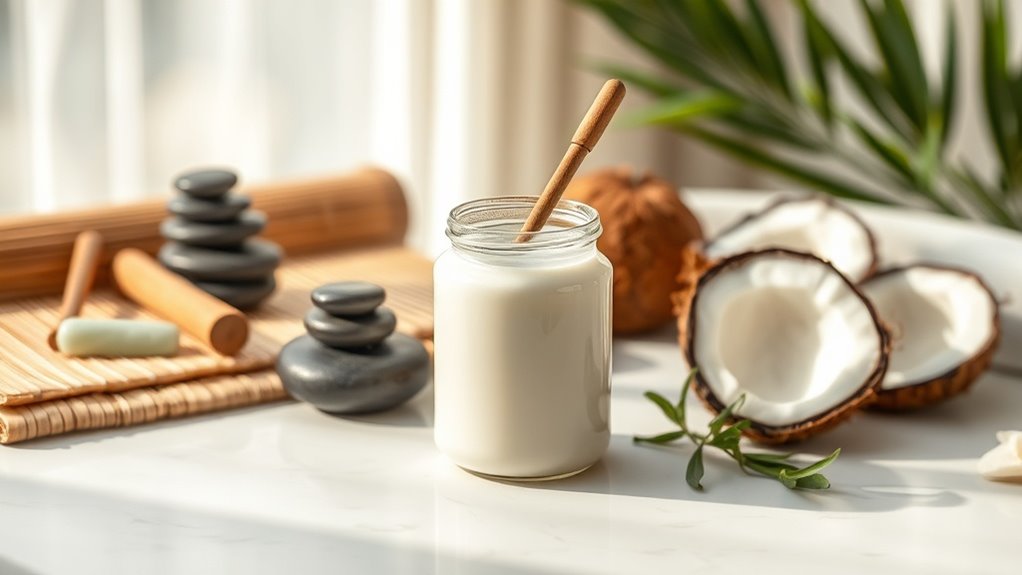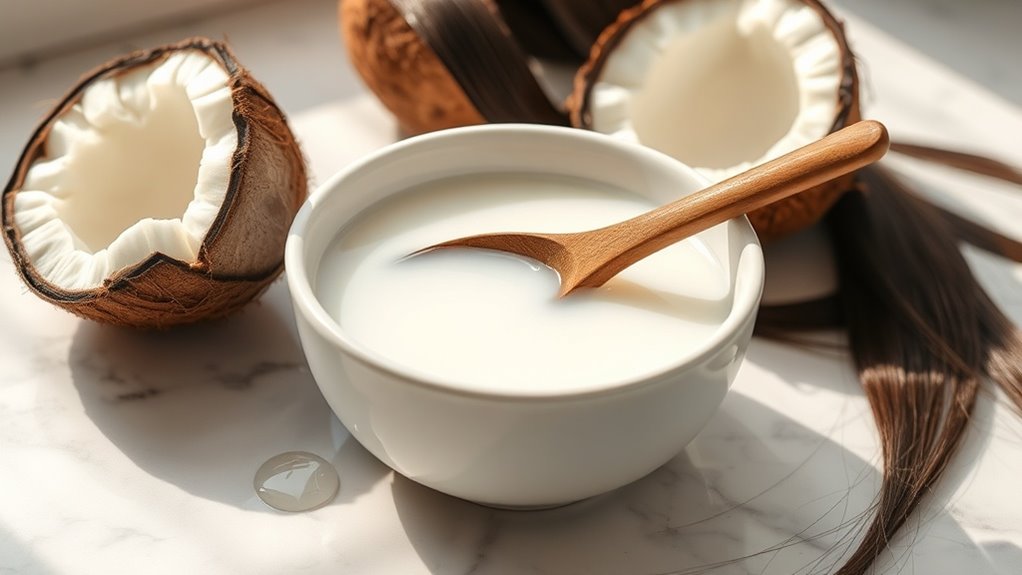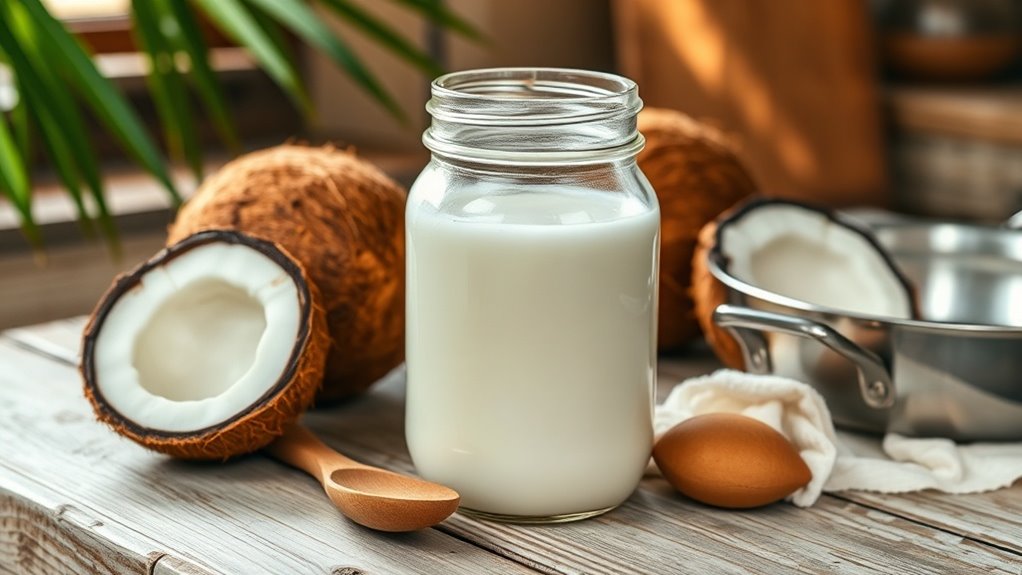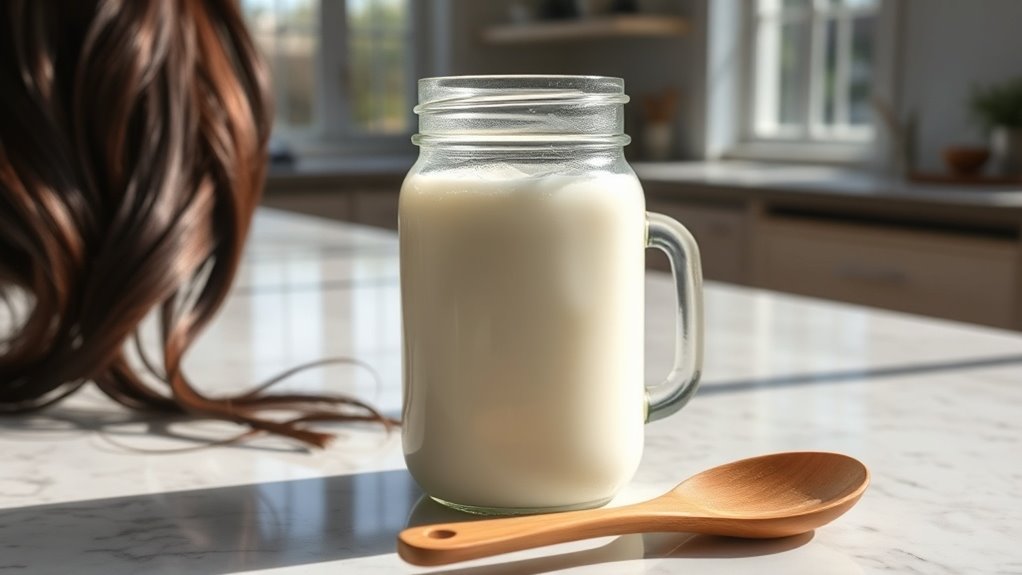Transform your hair with coconut oil’s scientifically-proven benefits. This natural wonder penetrates deep into your hair’s cortex thanks to its unique molecular structure, preventing protein loss and reducing breakage. You’ll love how its medium-chain fatty acids and essential nutrients like vitamins E and K nourish your strands from within. Apply it weekly as a mask, focusing on damaged areas, for softer, shinier, and healthier hair. Discover the specific techniques to maximize these remarkable results.
Key Takeaways
-
Apply warm coconut oil to sectioned, damp hair and massage from roots to ends for deep penetration and nourishment.
-
Leave the coconut oil treatment on for 30 minutes to overnight, covering with a shower cap for maximum benefits.
-
Choose virgin coconut oil for deep conditioning, refined for sensitive scalps, or fractionated for easy-absorption leave-in treatments.
-
Treat hair 1-2 times weekly based on hair type, with dry or chemically treated hair needing more frequent applications.
-
Coconut oil’s medium-chain fatty acids prevent protein loss, while vitamins E and K promote stronger, healthier hair growth.
The Science Behind Coconut Oil’s Hair Benefits
Unlike most oils that merely coat the hair shaft, coconut oil’s unique molecular structure allows it to penetrate deep into the hair cortex. Its medium-chain fatty acids, particularly lauric acid, have a strong affinity for hair proteins, helping prevent protein loss and strengthening each strand from within.
When you apply a coconut oil hair mask, you’re not just nourishing your hair superficially. You’re providing essential nutrients that reduce hygral fatigue – the swelling and contracting of hair when wet. This protection means less breakage, split ends, and damage from everyday styling.
The oil’s antimicrobial properties also help maintain a healthy scalp environment, while its moisture-retaining abilities keep your hair hydrated and manageable. You’ll join countless others who’ve discovered this natural solution for healthier, more beautiful hair.
Essential Nutrients Found in Coconut Oil
While most people know coconut oil mainly for its moisturizing properties, it’s packed with essential nutrients that nourish your hair from root to tip.
You’ll find medium-chain fatty acids, particularly lauric acid, that penetrate deep into your hair shaft to protect and strengthen each strand. The oil also contains vitamin E, an antioxidant that helps prevent hair damage from free radicals.
Your hair will benefit from coconut oil’s rich content of vitamin K and iron, which support healthy hair growth and help prevent breakage.
The presence of antimicrobial compounds like capric acid and caprylic acid keeps your scalp healthy by fighting off harmful bacteria and fungi.
These nutrients work together to give you the lustrous, healthy hair you’ve always wanted.
How Coconut Oil Penetrates Hair Strands
The remarkable penetrative power of coconut oil sets it apart from other hair treatments. Thanks to its unique molecular structure and low molecular weight, coconut oil easily slips past your hair’s protective outer layer, reaching deep into the cortex where it matters most.
Your hair’s structure naturally welcomes coconut oil because it’s rich in medium-chain fatty acids, particularly lauric acid. When you apply it, these molecules bind with the hair proteins, strengthening each strand from within.
Unlike heavier oils that sit on the surface, coconut oil’s small molecules travel through the hair’s cuticle scales, preventing protein loss and reducing hygral fatigue – the stress your hair experiences from repeated swelling and drying. This deep penetration is why you’ll notice lasting improvements in your hair’s strength and shine.
Types of Coconut Oil for Hair Treatment
Four main types of coconut oil serve as effective hair treatments: virgin, refined, fractionated, and MCT oil. Each type offers unique benefits for your hair care routine, so you’ll want to choose the one that best matches your needs.
| Type | Best For |
|---|---|
| Virgin | Deep conditioning, dandruff control |
| Refined | Sensitive scalps, frequent use |
| Fractionated | Leave-in treatments, easy absorption |
| MCT Oil | Scalp treatments, hair growth |
You’ll find virgin coconut oil delivers the most complete nutritional benefits, while refined oil works well for those sensitive to coconut’s natural aroma. If you’re looking for a lighter option, fractionated oil won’t solidify and spreads easily through your hair. MCT oil, extracted from coconut oil, penetrates deeply and won’t leave your hair feeling heavy.
Pre-Treatment Hair Assessment
Before applying any type of coconut oil to your hair, performing a thorough assessment helps determine the right treatment approach.
Start by examining your scalp’s condition – is it dry, oily, or balanced? Feel your hair strands to identify if they’re brittle, damaged, or healthy. You’ll also want to check for split ends and breakage.
Consider your hair’s porosity by placing a strand in water – if it floats, you’ve got low porosity; if it sinks quickly, it’s high porosity. This affects how well your hair will absorb the coconut oil.
Don’t forget to note your hair’s thickness and density, as these factors influence how much oil you’ll need and how long you should leave it in.
Your assessment results will guide you in customizing your coconut oil treatment for best results.
Basic Coconut Oil Hair Mask Recipe
Creating a basic coconut oil hair mask starts with selecting virgin or unrefined coconut oil as your foundation ingredient. You’ll want to warm 2-3 tablespoons between your palms until it liquefies. This amount works perfectly for shoulder-length hair, but adjust based on your hair length and thickness.
| Step | Action |
|---|---|
| 1 | Measure coconut oil |
| 2 | Warm between palms |
| 3 | Section your hair |
| 4 | Apply root to tip |
| 5 | Cover with shower cap |
Once you’ve warmed the oil, section your hair into manageable portions. Apply the oil thoroughly from roots to tips, ensuring even coverage. Cover your hair with a shower cap to lock in warmth and maximize penetration. Let the mask work its magic for 30 minutes, though you can leave it overnight for deep conditioning.
Advanced Hair Mask Combinations
While coconut oil works wonders on its own, combining it with complementary ingredients can target specific hair concerns and enhance its therapeutic effects.
For dry, damaged hair, mix coconut oil with honey and avocado to create an ultra-moisturizing treatment. If you’re battling dandruff, blend coconut oil with tea tree oil and aloe vera gel for a soothing scalp remedy.
For those seeking extra shine and strength, combine coconut oil with egg yolk and olive oil. You’ll love how this protein-rich mixture transforms your locks.
To promote growth and thickness, mix coconut oil with castor oil and a few drops of rosemary essential oil. These powerful combinations will give you salon-worthy results that’ll make your hair care routine feel like a luxurious spa experience.
Proper Application Techniques
The three key steps to properly applying coconut oil start with sectioning your clean, damp hair into manageable parts.
Working with small sections, warm the oil between your palms and gently massage it from roots to ends, ensuring even coverage. You’ll want to focus extra attention on your ends, which need the most nourishment.
For the final step, gather your hair into a loose bun and cover it with a warm towel or shower cap. This helps the oil penetrate deeply into your hair shaft.
Let it sit for at least 30 minutes, though many in our natural hair community prefer leaving it overnight for maximum benefits. If you’re new to this treatment, start with shorter intervals and adjust based on your hair’s response.
Optimal Treatment Duration
Since everyone’s hair responds differently to coconut oil treatments, you’ll need to experiment with timing to find your sweet spot.
Most hair types benefit from leaving the oil in for 30 minutes to 2 hours before washing. If you’ve got particularly dry or damaged hair, you might want to leave it overnight.
For a quick treatment, apply the oil 30 minutes before your shower. You’ll still get great results, especially if you’re consistent with weekly applications.
If you’re planning an overnight treatment, wrap your hair in a shower cap or silk scarf to protect your pillowcase. Just remember not to leave the oil in for longer than 24 hours, as it can attract dirt and become counterproductive.
Regular treatments every 1-2 weeks will give you the best results.
Best Practices for Washing Out
Removing coconut oil from your hair requires thorough cleansing to avoid lingering greasiness.
Start by applying shampoo directly to your dry, oil-treated hair before wetting it – this helps break down the oil more effectively. Massage the shampoo into your scalp and strands for at least 2-3 minutes.
You’ll likely need to shampoo twice to guarantee all the oil is gone. On your second wash, add water and work up a rich lather. Focus on your roots where oil tends to accumulate.
If your hair still feels heavy, try using clarifying shampoo, which is specifically designed to remove product buildup.
Finally, rinse with lukewarm water until it runs clear, and follow with your regular conditioner on the ends only.
Frequency of Coconut Oil Treatments
Generally, coconut oil treatments should be applied 1-2 times per week for ideal hair health. You’ll want to adjust your treatment frequency based on your hair’s texture and condition. If you’re dealing with extremely dry or damaged hair, you might benefit from two weekly treatments, while those with oily hair should stick to once weekly.
| Hair Type | Recommended Frequency |
|---|---|
| Dry/Damaged | 2x per week |
| Normal | 1x per week |
| Oily | 1x per week |
| Chemically Treated | 2x per week |
To maintain consistent results, you’ll need to establish a regular treatment schedule. Remember that over-treating your hair can lead to buildup, so don’t exceed the recommended frequency. Pay attention to how your hair responds and adjust accordingly – you’re looking for that sweet spot where your hair feels nourished but not weighed down.
Solutions for Different Hair Types
Different hair types require unique coconut oil solutions to achieve ideal results.
If you’ve got fine hair, apply a light coating from mid-shaft to ends, avoiding the roots to prevent weighing down your locks.
For thick, coarse hair, you’ll want to be more generous with the oil, working it thoroughly from roots to tips.
Those with curly hair can benefit from using coconut oil as a pre-poo treatment, letting it penetrate deeply before shampooing.
If you’re dealing with straight hair that’s prone to greasiness, focus on the ends only and use smaller amounts.
For color-treated hair, warm the oil slightly and apply it as an overnight mask to protect your investment and maintain vibrancy.
Addressing Common Hair Problems
Coconut oil stands out as a powerful solution for many common hair concerns.
You’ll find it particularly effective against dandruff, split ends, and frizz that can make you feel self-conscious about your hair’s appearance.
If you’re struggling with dandruff, massage warm coconut oil directly into your scalp before bedtime.
For split ends, apply a small amount to your hair tips daily.
When frizz is your main concern, rub a tiny drop between your palms and smooth it over your hair’s surface.
You’ll also notice coconut oil’s remarkable ability to combat hair loss.
It strengthens your hair follicles and promotes healthier growth, helping you maintain the full, beautiful hair you’ve always wanted.
Regular use can transform your hair from problematic to enviable.
Before and After Care Tips
To maximize coconut oil’s benefits for your hair, proper preparation and aftercare make all the difference. Before treatment, thoroughly cleanse your hair with a gentle shampoo to remove buildup.
Detangle your locks carefully with a wide-toothed comb to guarantee even oil distribution.
After applying coconut oil, wrap your hair in a warm towel or shower cap to enhance absorption. You’ll want to leave it on for at least 30 minutes or overnight for deeper conditioning.
When it’s time to wash, use lukewarm water and massage your scalp gently. Don’t rush the rinsing process – residual oil can make your hair appear greasy.
Style your hair as usual, but avoid heat tools for 24 hours to let your strands fully absorb the nourishing benefits.
Expert Recommendations
Hair specialists widely agree on the most effective ways to use coconut oil treatments.
You’ll find that most experts recommend applying warm (not hot) coconut oil to damp hair, focusing on the mid-lengths to ends. They suggest leaving the treatment on for at least 30 minutes, though overnight applications yield ideal results.
Top stylists emphasize using pure, organic coconut oil rather than mixed products.
You’re advised to limit treatments to once or twice weekly, as overuse can lead to buildup. If you have fine hair, experts recommend applying the oil only from mid-shaft down to prevent weighing down your roots. For those with thick or coarse hair, you can apply it root-to-tip.
Remember to always perform a patch test first, as recommended by dermatologists, to confirm you won’t have any adverse reactions.
Scientific Studies and Research
Research conducted by the Journal of Cosmetic Science reveals that coconut oil penetrates hair shafts more effectively than mineral or sunflower oils.
You’ll be pleased to know that multiple studies back up what countless users have experienced – coconut oil truly works wonders for your hair.
A 2021 study published in Scientific Reports confirms that lauric acid, coconut oil’s main fatty acid, reduces protein loss in both damaged and undamaged hair.
You’re also supported by research from the International Journal of Trichology showing that coconut oil’s molecular structure allows it to prevent hygral fatigue – the swelling and drying of hair that leads to damage.
These findings explain why you’ve likely noticed such positive results in your hair’s strength, shine, and manageability.
Natural Hair Growth Enhancement
Three key compounds in coconut oil can stimulate your hair’s natural growth cycle. Lauric acid penetrates the hair shaft to nourish follicles, while medium-chain fatty acids protect against protein loss.
Vitamin E, the third compound, improves blood circulation to your scalp, delivering essential nutrients to the roots.
You’ll notice improved growth when you massage coconut oil into your scalp three times weekly. The oil’s antimicrobial properties help clear blocked follicles while balancing your scalp’s natural oil production.
This creates the perfect environment for healthy hair growth. For best results, combine your coconut oil treatment with a protein-rich diet and gentle hair care practices.
You’ll join countless others who’ve discovered this natural solution for achieving longer, stronger hair.
Long-Term Hair Care Strategy
While regular coconut oil treatments form the foundation of your hair care routine, you’ll need an all-encompassing strategy to maintain lasting results. Start by planning your treatments and complementary care practices using this simple schedule:
| Morning | Evening | Weekly |
|---|---|---|
| Light oil mist | Deep conditioning | Hot oil treatment |
| Gentle brushing | Silk pillowcase | Scalp massage |
| Protection style | Loose braid | Protein mask |
You’ll want to combine these practices with a nutrient-rich diet and proper hydration. Make sure you’re protecting your hair from environmental stressors by wearing hats in harsh sunlight and using heat protectants when styling. Join our community of coconut oil enthusiasts to share experiences and stay motivated on your journey to healthier hair.
Frequently Asked Questions
Can Coconut Oil Treatment Make My Pillowcase Stain at Night?
You’ll likely notice oil stains on your pillowcase if you don’t protect it. Try wrapping your hair in a silk scarf or using an old pillowcase when sleeping with coconut oil treatments.
Does Coconut Oil Have an Expiration Date for Hair Treatments?
You’ll want to check your coconut oil’s expiration date, as it typically lasts 2-3 years. If it smells rancid or looks discolored, don’t use it in your hair treatments.
Can I Use Coconut Oil Alongside Other Hair Styling Products?
You can mix coconut oil with your favorite styling products, but don’t overdo it. Apply oil first, let it absorb, then style as usual to avoid making your hair greasy.
Will Coconut Oil Make My Scalp More Prone to Sunburn?
You won’t have increased sunburn risk with coconut oil – it actually has natural SPF properties. Still, if you’re spending time outdoors, you’ll want dedicated scalp sunscreen for full protection.
Can I Store Homemade Coconut Oil Hair Masks for Future Use?
You can store homemade coconut oil hair masks in an airtight container for up to two weeks in your fridge. Just warm it up before use, and you’ll love the results.

